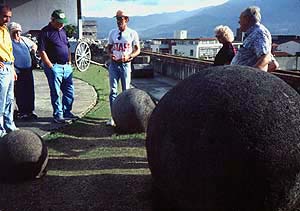Christopher Columbus landed in Costa Rica on his
fourth voyage to the New World, in 1502. Prior to that time there was
no recorded history of the people who lived there. Archaeologists have
since learned much about Costa Rica’s pre-Colombian residents,
but many mysteries remain. One of the most puzzling is the mystery of
Costa Rica's strange “spheres.”
The spheres are stone balls made of granite. They vary in size from about
the size of an orange to giant balls measuring more than six feet in
diameter and weighing 16 tons. All are perfectly round to within two
centimeters.
Thousands of these balls have been found along river beds and in ancient
cemetery sites in the valley of the Río Térraba, located
in the southwest portion of Costa Rica, and on Caño Island, nine
miles off the Pacific coast. Some of them were found at locations more
than fifty miles from the nearest site from which they could have been
quarried. They have not been found anywhere else in the world.
Who created these strange spheres? What was their significance to their
creators? How did they make them so perfectly round and transport them
so far from the source of the stone?
Some archaeologists think they were created by the Chibcha, an ancient
war-like people who used prisoners as slaves and human sacrifices and
built fortified towns in the region of Costa Rica where the spheres have
been found. If so, why and how they were created and transported is still
anybody’s guess.
Visitors to Costa Rica can see these spheres displayed at the National
Museum, outside of public buildings and decorating the gardens of Costa
Rican homes.
Click Here for information on our Costa Rica Tours.



